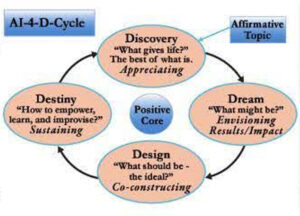Societal Influence of Christianity
The Fullness of the Great Commission
Christian witness can best be described within the context of the Great Commission from Matthew 28:18–20 which says, ‘go and make disciples of all nations . . . teaching them to obey everything I have commanded you.’ Influence of and participation in the common good can arguably be described within the context of Jeremiah 29:4–7, which says, ’[. . .] Build houses and settle down [. . .] Also, seek the peace and prosperity of the city to which I have carried you into exile. Pray to the Lord for it, because if it prospers, you too will prosper.’
John Stott said that a truly Christian understanding of evangelism and social action is to view social action as a partner of evangelism, and that there are two fundamental instructions of Jesus—a Great Commandment, ‘love your neighbour’ and the Great Commission, ‘go and make disciples’.1 Both directives give primacy to social action and evangelism being mandates for all Christians, and is supported by Jesus’ professed mandate in Luke 4:18–19.2
Christian witness in society is evident when there is kingdom impact in every sphere of society. What does that look like? This is what we will explore in the following pages:
- Current societal reputation of Christianity
- Christian witness through influence and participation in the common good
- Opportunities and barriers within spheres of society

Historic Influence of Christianity
The influence of Christianity may vary according to individual views and experiences, or whether one is in the Global West, Global South, or Global East. In general, Christianity has a long history in the West and has profoundly influenced the culture, politics, and values of many Western countries. In the Global South, Christianity has more recently emerged as a key part of culture. In either case, the reputation and influence of contemporary Christianity struggles in contemporary society.
The word ‘reputation’ refers to a moral honorability, to the way of living that impacts one’s relationships and context. We use it in this article because the meaning of the Great Commission refers to the model of Jesus Christ that his followers should embody to showcase to society what Christianity represents.
Western Christianity has strongly contributed to different definitional elements of Western culture including, ‘(…) democratic freedoms and scientific-technical progress, on the one hand; moral concern and a fundamental conception of human dignity and equality between men and women, on the other hand.’3 However, with the advent of the humanism of the 15th century, followed by the Enlightenment movement of the 17th and 18th centuries, and especially with the industrial revolution of the 19th century, the influence of the churches of the West decreased in many aspects of public life.
In recent decades there has been a decline in regular religious practice, an increase in secularization, and a growing diversification of beliefs and values. Some Western countries have adopted secular policies that seek to further separate religion from the state and public institutions. Today, in the West, the principle of heteronomy, which attached everything to the law of God, is being replaced by the logic of autonomy, characterized by three essential elements: subjectivation, differentiation and rationalization. The current context in the West has brought about the emergence of ‘a new type of human who thinks, knows, feels, reacts in a radically different way from their counterparts of the past [. . .]. One could almost say that this is a new human species that operates according to other criteria of judgment, other paradigms of thought, and inhabits a different world.’4
In the countries of the South where Christianity has only existed for a few centuries, its growth seems impressive. Indeed, newspapers and statistics announce the creation of several churches per day in Africa. In Latin America, according to José Antonio, Christianity is the popular religion.5 These descriptions suggest that the Great Commission remains effective in these parts of the world. However, this numerical growth does not fully account for the challenges of contextualized integration of the faith into traditional cultures. Today, Christianity is being viewed in the South as an alienating Western religion. For example, the pan-African ‘Kemite’ movement is rebelling against Christianity and is developing, both ideologically and academically, a re-evaluation of culture and traditional beliefs.
There are at least three reasons for this challenge. First, the historical legacy of slavery, which led to the ‘inferiorization’ of the souls of Blacks.6 Second, colonialism, which attacked the languages of the ‘barbarians’.7 Third, Christianization, which did not honor the culture of the colonized and destroyed the little that remained of their traditional heritage. The failure of policies and the results of poverty are additional factors aggravating the situation.

Current Influence of Christianity
Rev Joseph W. Handley Jr calls for deeper collaborative engagements to accelerate disciple-making in the world today. He argues that a ‘collaborative, communal approach to leadership that empowers multiple centres of influence as well as a diverse array of leaders is better suited to addressing the issues before us during this era of a globalized world’. In identifying the problem faced by the church he cited issues such as ‘loss of credibility,’ ‘diminishing of moral character (Protestantism)’ and ‘the Evangelical community being a disgrace of God’s character’.8 A Barna study was quoted as showing that only about 20% of Believers are involved in disciple-making.9
In 2021, the Lausanne Movement conducted multiple listening calls throughout its regional networks and issue groups, and discipleship was noted as one of the top three gaps with respect to the state of the Great Commission. In that conversation, evangelical leaders emphasized the importance of discipleship and training for ministry leaders and workers.10
Recent surveys of 1500 global evangelical leaders conducted by Lausanne reveal that the influence of the Christian church on the broader culture is largely non-existent, with 50-85 percent of respondents across five major regions of the world indicating none or minor levels of influence (see Figure 1). This is true across the Education, Media, Government, Technology, Finance, Business, Entertainment and Athletic sectors of societies across the world.11 In Euro-Eurasia and North America, the Christian church’s influence is perceived to be declining (see Figure 2).


Opportunities within Spheres of Society
Our world is in crisis. Pandemics, poverty, war, climate change, corruption, and injustice are issues presented daily in our news. The world’s current economic model is failing due to finite resources and the increasing social divide. Furthermore, cities are expecting 2.5 billion additional people by 2050, with 90 percent of this increase taking place in Asia and Africa.12 How then will people live?Will there be enough food, jobs, housing, education, or health care for everyone? Let us take a moment to reflect on the state of our world:
- 1 billion people live in slums.13
- 820 million people are going hungry.14
- 773 million adults are illiterate, most of whom are women.15
- 99 percent of people breathe air that contains high levels of pollutants.16
- 1.8 billion people suffer from living in high-risk flood zones.17
- 103 million people are forced to flee their homes yearly, 43 percent of whom are children.18
- 777 thousand girls under 15 years give birth each year.19
- 3 out of 10 of all pregnancies end in induced abortion.20
- 700 thousand people die by suicide every year.21
The opportunity to influence society lies exactly in the midst of such challenges. The centre of gravity of Christianity is continuously shifting southward, expanding to poorer countries, underlying a pressing need for long-term holistic models of evangelism and community development.22
Models of Evangelism and Community Development
How then do we address the problem of waning or non-existent Christian witness in society? Robert Linthicum has surmised that the church does ministry in the (community) in three distinct ways: in, to and with. 23
- The church ‘in’ the (community) has little or no involvement in the community; it is ‘in’ but not ‘of’ its community. This then would not be the church that is salt, bringing savour to, influencing, or impacting the community.
- The church ‘to’ the (community) decides what the needs are and what they will do to provide for the community—prescriptive and diagnostic without evidence.
- The church ‘with’ the (community) is incarnational, it comes alongside the people and works with them by listening, discovering the issues that affect them, and brings the ministry of the church out and into the community. It is the prophetic voice in the (community) and a compassionate and caring community bringing hope to the people of the (community).
Figure 3

As we look to the model Jesus set, the church should aim to be ‘with’ the community, loving their neighbor as themselves.
Additional models are available to aid with effective impact. One such model, Appreciative Inquiry (AI), a change management tool, provides an approach that can be used to impact communities and nations. It is an extreme departure from deficit-based change to a positive, strengths-based change approach, and represents a fundamental shift in the world of sustainable development. Appreciative Inquiry uses a 4-D Cycle (Discovery, Dream, Design, Destiny—see Figure 3) that allows a body (organization or community) to identify its positive core strengths and introduce concrete steps to achieve its goals. It is an approach to change that cultivates hope, builds capacity, releases collective appreciation and imagination, and brings about positive change. It is based on the simple idea that human beings move in the direction of what they want to discover. Appreciative Inquiry deliberately asks positive questions in and about the community to determine its potential for future development.24
From Today to 2050
In relation to 2050, what is needed to overcome the current perception, or reality, of the lagging influence of the Christian church in global society? The following are presented for consideration:
First, there is a key role for Christians to play in society—to transform lives. This surely means addressing issues of poverty, social justice, health care, environment, human rights, and material needs, but that is not all. There is something further that Christianity can offer that nothing else can: to give people a reconnected spirit, a renewed mindset, and a restored dignity. Acts of love and compassion are not easily measured with KPIs (key performance indicators), yet they have a profound human and eternal effect. They are what make Christianity go beyond the impact that mere development aid or philanthropy can ever achieve. They are the never-obsolete ingredients of the Great Commission.
Church leaders . . . should support and mentor emerging generations now to build deep roots of character, integrity, and relevance so that they may lead like Josiah, teach like Timothy, prophesy like Jeremiah, and change the world like the disciples.
Second, there is an opportunity arising out of illiteracy and connectivity. Currently, there are 773 million illiterate people in the world, and many more who can, but don’t read. This underlines the need to supply people with quality education, but also a fantastic opportunity for Christians to engage in or create audio-visual communication. The success of the series, The Chosen, the largest crowd-funded media project of all time, shows that hundreds of millions of people all around the world can hear about Christ through a filmed series.25 There are 18 billion phones in the world (more than humans) and more than 5 billion internet users worldwide.26 There is clearly an opportunity for Christians to use technologies and their creative minds to announce Christ to all corners of the earth.
Third, there is an opportunity that lies within intergenerational relationships and discipleship.27 Christianity has expanded significantly in some parts of the world over the last decades. Church leaders need to be intentional in listening to, understanding, and discipling emerging generations. They should support and mentor them now to build deep roots of character, integrity, and relevance so that they may lead like Josiah, teach like Timothy, prophesy like Jeremiah, and change the world like the disciples. A critical barrier to overcome for Christianity to thrive is the lack of communication and collaboration between generations. In many contexts, the leadership baton has not been passed in a timely or healthy way. This is an effort that must come both ways, with the hearts of the parents turning to their children, and the hearts of the children turning to their parents.28
Fourth, there is the need for collaboration between ministry and marketplace, and use of strategic tools that will create lasting impact in every sphere of society.
Conclusion
Christians in all areas of society are called to the Great Commission. This means not only proclaiming the Good News, but also forming and instructing people to be like Jesus. There is no way we will be able to reflect Christ in all spheres of society if we do not look outward to address the pressing issues of this world, make use of and engage in creative means of communication, and connect our generations, cultures and denominations towards a common goal of making Christ known. Through the prayerful, prophetic presence of the believer engaging society in every sphere of society, we trust and pray that Christ will be known in every sphere of society.
Endnotes
- John R. W. Stott, Christian Mission in the Modern World (Downers Grove, IL: Intervarsity Press, 1975), 27.
- ‘The Spirit of the Lord is on me, because he has anointed me to proclaim good news to the poor. He has sent me to proclaim freedom for the prisoners and recovery of sight for the blind to set the oppressed free, to proclaim the year of the Lord’s favor.’
- Philippe, Portier and Willaime Jean-Paul. Le Christianisme Et La Modernité Européenne. Récuser Le Déni. Fondation pour l’innovation politique (Décembre 2018).
- Bruno Mori. « 13. L’effondrement de la religion en Occident », , Pour un christianisme sans religion. Retrouver la « Voie » de Jésus de Nazareth, sous la direction de Mori Bruno. Karthala, 2019, pp. 93-102.
- Lindhardt, Martin and Thorsen, Jakob Egeris, Christianity in Latin America: Struggle and Accommodation, (Handbook of Global Contemporary Christianity), 167–187. Accessed May 2023.
- More information in https://www.lesresumes.com/litterature/jean-claude-carriere-la-controverse-de-valladolid-resume-personnages-et-analyse. Accessed May 5, 2023.
- This recalls the ‘glottophagy’ of Louis-Jean Calvet (1974), who, in his book: Linguistics and Colonialism, ‘violently denounces the eating of languages, more exactly the tendency of French colonialism to fight African languages’.
- Joseph Handley, “The Great Collaboration: Catalyzing Disciple Making for the Global Church,” Evangelical Review of Theology 47, no. 2 (May 2023), 101-107.
- Barna, Leadership, Archived Research, New Research on the State of Discipleship … Breaking Down Discipleship, https://www.barna.com/research/new-research-on-the-state-of-discipleship/, Dec 1, 2015.
- “The Evangelical Church Interacting between the Global and the Local: An Executive Summary of the Analysis of Lausanne 4 Listening Calls,” Lausanne Movement, Accessed June 5, 2023, https://lausanne.org/l4/global-listening/the-evangelical-church-interacting-between-the-global-and-the-local. The dominant themes that emerged within the category of the first question on the remaining gaps were ‘need for discipleship’, ‘reaching younger generations’, ‘love and unity’, ‘diversity in leadership’, ‘churches not engaging with the outside world’, ‘the remaining unreached people groups (UPGs)’, ‘advance of Isl am and need for Muslim evangelism’, ‘environmental crisis and creation care’, ‘lack of cross-cultural missions’, ‘lack of contextualization’, and ‘need for marketplace and workplace ministries’.
- Lausanne Great Commission Team Survey of 1500 global evangelical leaders, 2023.
- “68% of the world population projected to live in urban areas by 2050, says UN,” United Nations Department of Economic and Social Affairs, last modified May 2018, https://www.un.org/development/desa/en/news/population/2018-revision-of-world-urbanization-prospects.html.
- “Urban Development,” The World Bank, last modified Apr 3, 2023, https://www.worldbank.org/en/topic/urbandevelopment/overview.
- “Richest 1% bag nearly twice as much wealth as the rest of the world put together over the past two years,” Oxfam International, last modified, January 16, 2023, https://www.oxfam.org/en/press-releases/richest-1-bag-nearly-twice-much-wealth-rest-world-put-together-over-past-two-years.
- “Literacy,” UNESCO Institute for Statistics, Last modified May 2023, https://uis.unesco.org/en/topic/literacy.
- “Air Pollution,” World Health Organization, accessed May 2023, https://www.who.int/health-topics/air-pollution#tab=tab_1.
- “Urban Development,” The World Bank, last modified Apr 3, 2023, https://www.worldbank.org/en/topic/urbandevelopment/overview.
- “Figures at a Glance, 103 million forcibly displaced people worldwide,” UNHCR, accessed May 2023. https://www.unhcr.org/us/about-unhcr/who-we-are/figures-glance#:~:text=At%20least%20103%20million%20people,employment%20and%20freedom%20of%20movement.
- “Adolescent and young adult health,” World Health Organization, last modified April 28, 2023, https://www.who.int/news-room/fact-sheets/detail/adolescents-health-risks-and-solutions.
- “Abortion,” World Health Organization, accessed May 2023. https://www.who.int/health-topics/abortion#tab=tab_1.
- “Suicide,” World Health Organization, last modified June 2021, https://www.who.int/news-room/fact-sheets/detail/suicide.
- “Looking Forward: An Overview of World Evangelization, 2005-2025,” Lausanne Movement, last modified 2004, https://lausanne.org/content/looking-forward.
- Gaspar Colón, “Incarnational Community-Based Ministry: A leadership Model for Community Transformation,” The Journal of Applied Christian Leadership 6, no 2 (2012), 11-12. https://www.andrews.edu/services/jacl/article_archive/6_2_fall_2012/02-shortarticles/jacl_6-2_colon.pdf.
- David Cooperrider, “What is Appreciative Inquiry?” 2012, accessed April 30, 2023, https://www.davidcooperrider.com/ai-process/.
- “Story about life of Jesus emerges as largest crowdfunded entertainment project in history,” Fox News, last modified January 2019, https://www.foxnews.com/entertainment/story-about-the-life-of-jesus-largest-ever-crowdfunding-campaign-for-a-tv-show.
- ”Number of internet and social media users worldwide as of January 2023,” Statista, accessed January 2023, https://www.statista.com/statistics/617136/digital-population-worldwide/.
- ‘Effective intergenerational cohesion enables leaders to understand, empower and lead people. There are more generations mixing in the workplace, in communities, families and households than ever before. Understanding their differences and nuances is key to creating cohesive communities.’ “The Generations Defined,” McCrindle Research, accessed May 13, 2023, https://mccrindle.com.au/insights/blog/the-generations-defined/.
- Malachi 4:5







